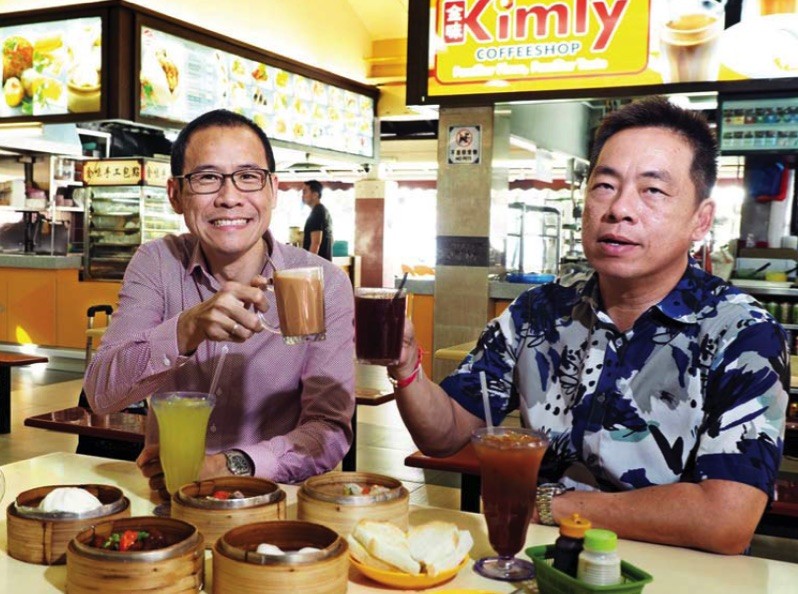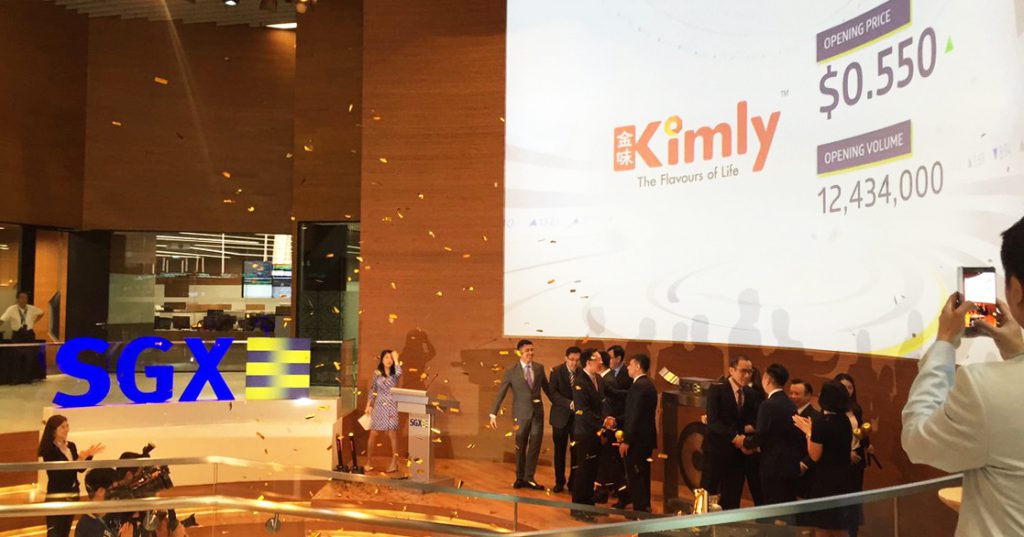[Update, 5 Dec] Kimly’s executive chairman Lim Hee Liat and executive director Chia Cher Kiang were arrested by the Commercial Affairs Department (CAD) on Tuesday (4 Dec), but were later released on bail.
In a filing to the Singapore Exchange, the Kimly Group mentioned that they were “arrested for having been concerned, or reasonably suspected of being involved in, an offence under Section 199 of the Securities and Futures Act”.
–
[Update, 30 Nov 2018] Kimly has backed out of its $16 million acquisition of drinks manufacturer Asian Story Corporation (ASC), reported The Straits Times.
Its stock was also voluntarily suspended since 27 Nov (Tues), amid speculation of disclosure gaps.
However, it has since requested for trading of its stocks to resume.
This comes after Kimly and ASC received letters from the Commercial Affairs Department (CAD) and the Monetary Authority of Singapore (MAS) that requested for documents “due to a potential offence under the Securities and Futures Act”.
The documents in question are related to Kimly’s IPO in 2017, its acquisition of ASC, and its corporate secretarial records from 1 Jan 2016.
ASC, on the other hand, was asked to produce its corporate secretarial and financial records, as well as documents relating to its recent acquisition by Kimly.
Additionally, authorities have requested for the IT equipment used by Kimly’s executive chairman Lim Hee Liat, executive director Chia Cher Khiang, and former non-executive director Ong Eng Sing.
Both Mr Lim and Mr Chia have also been interviewed by the CAD, and have surrendered their travel documents as well.
Said Kimly on the matter: “The authorities have not disclosed to the company any further details of its investigation.”
It also added that it “intends to cooperate fully with the investigations [and] its executive directors will continue in their roles given that no formal charges have been made”.
According to the kopitiam operator, drinks manufacturer Pokka Corporation (Singapore) had signalled its intent to terminate a manufacturing agreement with ASC last week, which led to Kimly’s board to look into the potential impact.
Following discussions and “taking into account the impact of the termination on ASC as well as other relevant factors”, they decided to roll back the acquisition.
Kimly revealed that it has since been repaid $12 million, with the balance to be paid back over three years.
As a quick background, Kimly completed the acquisition of ASC from seller Wang Chia Ye on 2 Jul 2018 for $16 million in cash.
The transaction gave Mr Wang an “earn-out payment”, which depended on the amount of pre-tax profit that ASC made in 2018.
“If the pre-tax profit exceeds S$2 million, he will be entitled to an earn-out payment of S$8 million; if it is below S$2 million, the earn-out payment will be pro-rated,” reported The Business Times.
Given the recent turn of events, ASC’s financial results for the year have not been consolidated into its unaudited financial statements.
Learn more about the Kimly Group in our article from Mar 2017 below.
–
Even if you’re not one to dabble in stocks, the recent IPO by coffeeshop operator Kimly Limited would have definitely caught your attention.
With an offer of 173.8 million new shares at 25 cents each, the group was expected to have a market value of $288.7 million after the IPO.
Touted as the first ‘kopi-o IPO’ (kopi-o is local speak for black coffee), the group had announced its plans to use the net proceeds of about S$40.4 million from the IPO for acquisitions, joint ventures, as well as general business expansion.
The money would also be used for refurbishment and renovation of 64 food outlets and 121 food stalls across Singapore heartlands.
Expansion and update of the corporate headquarters and Central Kitchen would also take place, alongside the boosting of productivity.

Fast forward to the day of the IPO, and the results revealed an oversubscription of the public tranche by over 335 times. In all, the offering was said to be oversubscribed 8.3 times.
The stock also surged to 55 cents, a 120% leap from its offer price.
But in spite of them supplying the nation their daily dose of caffeine, Kimly is barely a Facebook, Google, or Uber when it comes to how much the public knows about it, so we decided to try and uncover a bit more about the very successful group behind Singapore’s first ‘kopi-o IPO’.
1. Kimly Was Founded In 1990

Founder Mr Lim Lee Liat is a self-professed “kopi kid” with a love for coffeeshops, and even revealed that dates with his wife, and hangout sessions with friends were frequently located there.
When he was 24, he decided to take his love for the venue a step further, and started his first coffeeshop venture in 1990 with several friends, including Mr Peh Oon Kee. Of the founders, both Mr Lim and Mr Peh are still shareholders of the group.
Also, instead of simply letting customers get used to what they were offering, the group placed an emphasis on understanding the preferences of customers, even “regularly holding networking sessions, visiting other coffee shops and obtaining feedback from customers”.
From inception to 2003, the group took the path to expansion, and added 25 self-managed coffee shops to their portfolio.
2. The Group Operates 4 Foodcourts In Local Tertiary Institutes

Air-conditioned foodcourts are an increasingly common sight, especially in sprawling campuses and new estates.
The group saw a golden opportunity in the operation of these slightly more comfortable eating spots, and their first venture was at Ngee Ann Polytechnic in 2011 under the “foodclique” brand.
The expansion wasn’t simply for short-term profits – the group mentions that moving into running food courts in these campuses “[enhances their] brand equity and image as these students, following graduation and upon becoming working adults and starting their own families, will be familiar and well-acquainted with the memories of their former school canteen”.
The group currently operates 4 more of these foodcourts, 2 in the National University of Singapore (NUS), 1 in SIM University and 1 at Hotel Boss, where they operate a ‘local favourites’-themed food court.

Unfortunately, their Ngee Ann Poly branch would be ceasing operation from April this year, given that their tender for a renewal was unsuccessful.
3. A Traditional Business With A Penchant For Trying New Tech
Albeit being a traditional business at heart, they’ve not been averse to taking on new technology.
In 2014, they implemented a $23,000 automatic conveyor belt system for the returning of plates and trays at their foodcourt in SIM University, and it’s said to be the first of its kind in Singapore then. The system helped to reduce the time needed to clear 360 tables from 90 man-hours to 54.
Today, we see the same system at Timbre+, a hip ‘gastropark’ opened in April last year.

Using the funds raised from the IPO, the group also revealed in its Offer Document that they would be looking into the implementation of cashless electronic payment systems at their food outlets.
“With the advancement of mobile and digital payment systems, there is a greater degree of cashless and even cardless payments in Singapore. As such, we believe that [this] will enable us to keep up to date with changing consumer trends in the long run.”
But getting the regular Singaporean to ditch cash for cards at coffeeshops and foodcourts isn’t as simple as it seems, so the group is intending to first test it out at the demographic more attuned to such new tech – millennials.
They would be beginning pilot tests for a cashless electronic payment system by way of NETS FlashPay at SIM University foodcourt, and also piloting an electronic wallet system for the outlet in NUS.
If successful, they plan to roll out this system for the rest of their outlets across the island.
4. They Acquired A Chain Of Dim Sum Stores In 2008

There are 43 Kimly Dim Sum stores located around the island currently, but did you know that the group didn’t start the chain from scratch?
In 2008, the group revealed that they had acquired a chain of dim sum stores, and since then, have been feeding Singaporeans hungry for har gao in the heartlands.
34 of their Dim Sum outlets are also open 24-hours, so any midnight cravings could be sufficiently satisfied.
5. They’re Moving Into Food Delivery
And speaking of satisfying cravings, the group saw the potential in expanding their reach via food delivery, and in November last year, partnered with food delivery provider Deliveroo so that customers could get their siew mai without the need to leave their homes or desks.
“We believe that the introduction of online food ordering and delivery services for our Dim Sum will provide our Group with an additional avenue to sell our products. This would target a new segment of customers, as the target consumers in this case would be those who are normally not frequent patrons of our food outlets.”

Wanting to be the “alternative fast food delivery choice”, they are currently working Getz Group Pte Ltd, a specialist F&B technology solutions provider, to create an online ordering system for customers who want to do pre-orders online.
For customers already at their food outlets, unique QR codes would also be put on the tables so that they can use their mobile devices to browse food offerings and place orders for food.
“We hope to be prepared for a food revolution led by technology and cater to our tech-savvy patrons,” said the group.
It’s Not Surprising As To Why Their IPO Was Oversubscribed

Growing yearly profits, a significant presence in Singapore, an experienced management team, and a willingness to take on new initiatives to maximise manpower and time – these are a few of the main reasons why Kimly received such overwhelming results in their IPO.
Theirs is a success story of a traditional business embracing change, and we can’t wait to see how they will be refreshing (and saving) our dwindling coffeeshop culture.
Featured Image Credit: Singapore Exchange Twitter










